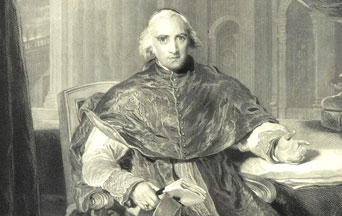
The British government’s three conditions for granting an Emancipation Bill were the main points of disagreement between English and Irish Catholics during the early nineteenth century. These conditions were an oath of allegiance, the right to veto Holy See appointments in Great Britain and Ireland, and the need for prior official authorization to publish any ecclesiastical documents in England.
For the Irish, the oath of fidelity was the most odious of these conditions. It required anyone who held public office or wished to enjoy full rights to deny papal supremacy, the dogma of transubstantiation, devotion to Our Lady and the saints, and to detest the Roman Pontiff. It was called the test or supremacy oath.
Irish Catholics saw the proposal for an Emancipation Bill as a hard-won victory after centuries of persecution and unrelenting struggle for the freedom of the Church. However, the Irish believed that they should achieve emancipation without any compromise. Moreover, they preferred to resume the fight rather than admit restrictions to the freedom they had already obtained after so many sacrifices. They believed that accepting England’s demands betrayed their forefathers’ loyalties to Holy Mother Church.
For their part, the weaker English Catholics saw the bill as something far more generous than they dared hope. They had not fought to get it. In their minds, approval would bring peace to those who were so tired of persecution. Under its terms, English Catholics could leave their hiding places, walk in the sunlight, and lead lives similar to those of their Protestant compatriots.
Eternal and Natural Law: The Foundation of Morals and Law
Giovanni Battista Cardinal Quarantotti revived the conflict. He wrote that he was willing to accept the need for prior authorization, the government’s veto in exclusively political matters, as well as the oath of fidelity with restrictions. The English saw his statement as a justification for their position. For the Irish, it represented a new battlefront. They deemed the statement as a mere expression of Cardinal Quarantotti’s personal opinion. Indeed, the cardinal failed to consult the pope before publishing it.
Ercole Cardinal Consalvi, Pius VII’s Secretary of State, arrived in London at the height of the dispute. His mission was particularly difficult. The sovereigns of Russia, England and Prussia were not Catholic. Nominally Catholic Austria planned to seize territories that belonged to the Holy See. Unable to count on Austrian support, Cardinal Consalvi sought to win the good graces of England. He naturally worried that the Irish might create obstacles to his policy.
Moreover, influenced by the French Revolution, he aligned himself with those who advocated allying the Church with the new times. He put all his talent at the service of this goal. Therefore, Cardinal Consalvi was the least suitable man to inform Rome about the situation of Catholics in the British Isles. It is not surprising that events completely contradicted his report.
Cardinal Consalvi recognized that Irish devotion to the Holy See was capable of every sacrifice and even martyrdom. However, he found them backward in their conceptions and knowledge and obsessed with hatred for England. Even more seriously, they sometimes put religion at the service of politics. He found the English more accommodating, although not always disinterested. The influential Anglo-Irish politician Lord Castlereagh said the government did not want to ask for anything contrary to Church principles. However, it continued demanding the oath, approval of Church documents published in England, the veto, and having a representative of the pope in London.
 Learn All About the Prophecies of Our Lady of Good Success About Our Times
Learn All About the Prophecies of Our Lady of Good Success About Our Times
On September 17, 1814, the Congregation for Ecclesiastical Affairs decided that the oath of allegiance and the veto could be accepted, subject to reasonable limitations, but not government approval of Church documents. Cardinal Consalvi ably emphasized the bright side of this decision. Knowing the atmosphere in England well, he advised Lord Castlereagh to delay the Emancipation Bill. Enjoying the full confidence of Pius VII, he recommended that the Holy See adopt the same attitude.
In 1815, Lorenzo Cardinal Litta wrote a letter to Bishop William Poynter, leader of the English Catholics. Cardinal Litta stated that he thought one should accept the oath and veto if emancipation were granted. However, the Sovereign Pontiff had not yet adopted this position. Bishop Poynter made this letter public. For English Catholics, it was a short-lived triumph. The Irish began a formidable campaign against the projected bill and sent a delegation to Rome to explain to the pope the actual situation in Ireland.
On February 1, 1816, Pius VII wrote the Archbishop of Dublin, John Thomas Troy, explaining why he partly agreed with England’s demands. The pontiff saw emancipation as so great a benefit that he did not think it reasonable to refuse the limitations imposed by the royal government.
Aware of their rights and strength, the Irish believed they could obtain emancipation without compromise. However, faced with this letter, all they could do was abide by the pope’s will. Unfortunately, however, the police closed Daniel O’Connell’s Irish Catholic Association. Until the death of Pius VII in 1823, the English government took no decisive steps toward emancipation.

